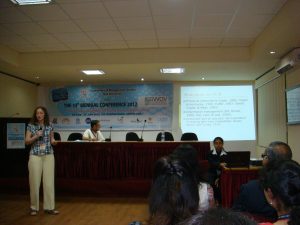
Occupational health research is focused on the health and well-being of employees. This concern is shared by both workers and organizations. Work plays such a central role in our lives that it is no surprise it can affect our health.
Together with my colleagues, we have examined different methods used in occupational health research, and also created a framework for studying employee mistreatment at different levels.
One stressor I have studied is Organizational Constraints. I examined constraints in relation to other stress variables, as well as to employee performance. We were surprised that organizational constraints, while very stressful, did not have a substantial impact on performance, and we subsequently tested different reasons for that. We found two explanations for the small effect on performance: Upward adjustments that raters make to their performance ratings when constraints are present, and a perspective some employees take, viewing constraints as a challenge rather than a hindrance. These two elements increase employee performance ratings when constraints are high. We are still working towards a better understanding of organizational constraints using different methodologies.

I am also interested in Safety Climate. My colleagues and I have examined the effects of safety climate when considering different sources of climate, as well as for individuals with different levels of occupational callings.
Other research that I’m doing includes illegitimate tasks and their effects on employees, looking at the effects of workload on performance and strain, the relationship between occupational callings and work stress, and how mindfulness can buffer the effects of workplace boredom on cyberloafing. And this is just a a taste of what’s going on!
If you want to hear some of my ideas about the future of cyberloafing research, I gave a talk on the topic at the Work, Stress & Health conference in Philadelphia, 2019:
Select Publications
Lowman, G., Kessler, S. R., & Pindek, S. (2023). The permeation of loneliness into the workplace: An examination of robustness and persistence over time. Applied Psychology: An International Review. (Online first)
Pindek, S., Shen, W., & Andel, S. (2023). Finally, some “me time”: A new theoretical perspective on the benefits of commuting. Organizational Psychology Review, 13(1), 44–66.
Weigelt, O., French, K. A., de Bloom, J., Dietz, C., Knoll, M., Kühnel, J., Meier, L. L., Pindek, S., Prem, R., Schmitt, A., Syrek, C. J., & Rink, F. A. (2023). Moving from opposition to taking ownership of open science to make discoveries that matter. Industrial and Organizational Psychology: Perspectives on Science and Practice, 15(4), 529–532.
Pindek, S., Shen, W., Gray, C., & Spector, P. (2022). Clarifying the inconsistently observed curvilinear relationship between workload and employee attitudes and mental well-being. Work & Stress, 37(20), 195-221.
Andel, S.A., Pindek, S., & Spector, P.E. (2022). Adding fuel to the fire: The exacerbating effects of calling intensity on the relationship between emotionally disturbing work and employee health. Journal of Occupational Health Psychology, 27(5), 488–502.
Zhou, Z., Pindek, S., Ray, E. (2022). Browsing away from rude emails: Effects of daily active and passive email incivility on employee cyberloafing. Journal of Occupational Health Psychology, 27(5), 503–515.
Kita, E., Luria, G., Pindek, S., Albert, G., & Lotan, T. (2022). The use of risk homeostasis theory to reduce smartphone use during low-speed driving. Accident Analysis and Prevention, 168, 106596.
Gazica, M.W., & Pindek, S. (2022). How does caring for patients affect work interference with family in nurses? A daily diary study. International Journal of Stress Management.
Pindek, S., Zhou, Z.A., Kessler, S.R., Krajcevska, A., & Spector, P.E. (2022). The lingering curvilinear effect of workload on employee rumination and well-being: A diary study. Work & Stress, 36(30), 292-311.
Andel, S.A., Pindek, S., & Arvan, M. (2022). Bored, angry, and overqualified? The high-and low-intensity pathways linking perceived overqualification to behavioural outcomes. European Journal of Work and Organizational Psychology, 31(1), 47-60.
Koslowsky, M., Pindek, S., & Reizer, A. (2022). Impression management in everyday life. In D. Chadee (Ed.), Theories in social psychology (pp. 350-371). Wiley-Blackwell, xiv.
Hutchinson, D., Luria, G., Pindek, S., & Spector, P. (2021). The effects of industry risk level on safety training outcomes: A meta-analysis of intervention studies. Safety Science, 152, 105594.
Steele, L.M., Pindek, S. & Margalit, O. (2021). The advantage of disadvantage: Is ADHD associated with higher creativity at work? Creativity Research Journal, 33(3), 275-283.
Pindek, S., & Segel-Karpas, D. (2021). Do satisfied older employees perceive more social support over time? A cross-lagged examination. Applied gerontology, 40(6), 670-678.
Pindek, S., Lucianetti, L., Kessler, S.R., & Spector, P.E. (2020). Employee to leader crossover of workload and physical strain. International Journal of Stress Management.
Kessler, S.R., Lucianetti, L., Pindek, S., Zhu, Z., & Spector, P.E. (2020). Job satisfaction and firm performance: Is a happy workforce more productive? Journal of Applied Social Psychology, 50(10), 563-572.
Pindek, S., & Gazica, M.W. (2020). Being Called to Nursing: Buffering the Stress-Rumination Effects. Occupational Health Science, 4, 401–416.
Pindek, S., & Segel-Karpas, D. (2020). Do Satisfied Older Employees Perceive More Social Support over Time? A Cross-Lagged Examination. Applied gerontology.
Kessler, S.R., Lucianetti, L., Pindek, S., & Spector, P.E. (2020). “Walking the talk”: the role of frontline supervisors in preventing workplace accidents. European Journal of Work and Organizational Psychology, 29(3), 450-461.
Arvan, M., Shimon, Y., Pindek, S., Kessler, S.R., & Spector, P.E. (2020). Examining temporal precedence between customer mistreatment and customer-directed counterproductive work behavior. International Journal of Stress Management.
Andel, S.A. Kessler, S.R., Pindek, S., Kleinman, G.K., & Spector, P.E. (2019). Is cyberloafing more complex than we originally thought? Cyberloafing as a coping response to workplace aggression exposure. Computers in Human Behavior, 101, 124-130.
Arvan, M., Pindek, S., Andel, S.A., & Spector, P.E. (2019). Too Good for Your Job? Disentangling the Relationships Between Objective Overqualification, Perceived Overqualification, and Job Dissatisfaction. Journal of Vocational Behavior.
Kessler, S.R., Pindek, S., Kleinman, G.K., Andel, S.A., & Spector, P.E. (2019). Information security climate and the assessment of information security risk among healthcare workers. Health Informatics Journal.
Andel, S.A., Pindek, S., & Spector, P.E. (2019). When antecedent becomes consequent: An examination of the temporal order of job dissatisfaction and verbal aggression exposure in a longitudinal study. Work & Stress, 33(4), 334-350.
Pindek, S., Demircioğlu, E., Howard, D.J., Eatough, E.M., & Spector, P.E. (2018). Illegitimate Tasks Are Not Created Equal: Examining the Effects of Attributions on Unreasonable and Unnecessary Tasks. Work & Stress, 33(3), 231-246.
Pindek, S., Arvan, M., & Spector, P.E. (2018). The stressor–strain relationship in diary studies: A meta-analysis of the within and between levels. Work & Stress, 33(1), 1-21.
Pindek, S., Krajcevska, A., & Spector, P.E. (2018). Cyberloafing as a coping mechanism: Dealing with workplace boredom. Computers in Human Behavior, 86, 147-152.
Pindek, S., Kessler, S.R., & Spector, P.E. (2017). A quantitative and qualitative review of what meta-analyses have contributed to our understanding of human resource management. Human Resource Management Review, 27(1), 26-38.
Andel, S.A., Pindek, S., & Spector, P.E. (2016). Being Called to Safety: Occupational Callings and Safety Climate in the Emergency Medical Services. Journal of Occupational and Environmental Medicine, 58(12), 1245-1249.
Spector, P.E., & Pindek, S. (2016). The future of research methods in occupational health psychology. Applied Psychology: An International Review, 65(2), 412-431.
Pindek, S., & Spector, P.E. (2016). Explaining the surprisingly weak relationship between organizational constraints and job performance. Human Performance, 29(3), 192-208.
Pindek, S., & Spector, P.E. (2016). Organizational constraints: A meta-analysis of a major stressor. Work & Stress, 30(1), 7-25.
Pindek, S., & Spector, P.E. (2015). Contextual factors in employee mistreatment. In P.L. Perrewé, J.R.B. Halbesleben, and C.C. Rosen (Eds.), Research in Occupational Stress and Well Being: Mistreatment in Organizations, Vol 13, (pp. 193-224). Emerald Group Publishing Limited.
Koslowsky, M. & Pindek, S. (2011). Impression management: Influencing perceptions of self. In D. Chadee (Ed.), Theories in social psychology (pp. 280-296). Wiley-Blackwell, xiv.
Pindek, S., Weisberg, J., & Koslowsky, M. (2010). Human resource management in Israel: A multi-faceted perspective. Human Resource Management Review, 20(3), 173-175.
For my full CV, see below.